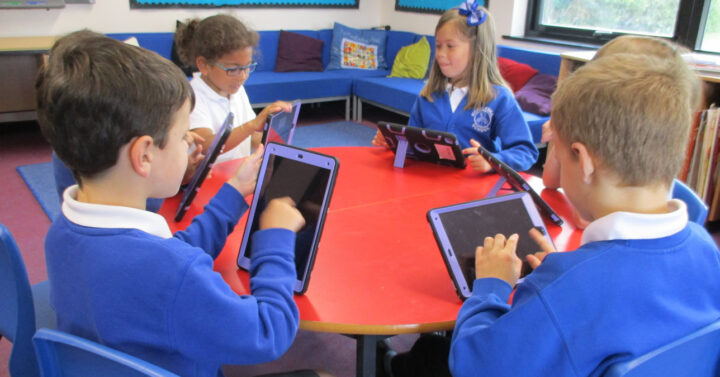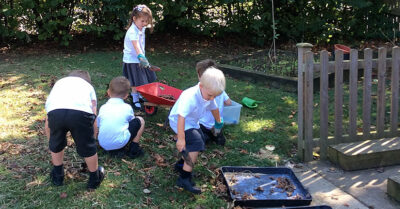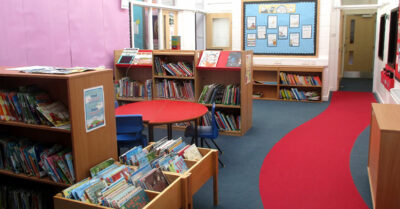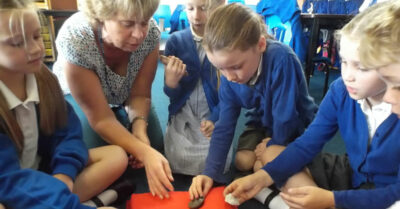Mendlesham Primary School has achieved the Inclusive School Award.

Grow in Numbers
Mendlesham Primary School is a small rural primary school accommodating approximately 100 children and is part of the John Milton Academy Trust. The school has recently opened a Special Educational Needs and Disability (SEND) provision, ‘The Mulberry Unit’ in collaboration with Special Educational Needs and Disabilities Academies Trust (SENDAT) and this enabled the school to grow in numbers and increase their provision for SEND students. The school is led by an Executive Headteacher and a Head of School. An Assistant Headteacher oversees the ‘Mulberry’ unit and although employed by SENDAT works closely with the school leaders to ensure there is a collegiate and fluid provision in place for children and staff.

The Mulberry unit is a cognition and learning based unit for Key Stage Two. SENDAT employs the staff and admissions are through the local authority. However, pupils are placed on the roll of the main primary school and as such the responsibilities for Attainment, Attendance and Safeguarding are for Mendlesham Primary. Children attending the unit have access to the main school curriculum bespoke to individual needs. Examples of where this currently occurs include, gym, swimming, PE, art classes and attending assemblies. At Christmas the staff adjusted the Christmas nativity to allow children to continue to have a key role and ‘Mulberry’ children are invited to the Key Stage Two residential. Mulberry children and staff are included within the school house teams. Staff attend the main school Continuing Professional Development (CPD) days and staff meetings.
Parents Highly Complimentary of Support
Parents spoken to were highly complimentary of the levels the support staff at the school go to, to ensure their children can be successful. A child that had experienced significant medical issues and consequently had falling attendance had a bespoke package of support put in place which offered the child the best opportunities to attend school where she could.
Parents describe multiple examples of staff who have made reasonable adjustments to accommodate an identified need to ensure children do not become disadvantaged, but an ethos that challenges barriers to learning. Parents were also keen to identify that families were supported as much as the children, they say the school is welcoming and they are never made to feel that they are a nuisance. Support in dealing with and challenging other external professionals is also greatly appreciated. Where some children could have been targeted by other children because of their needs, parents describe an accepting and supportive culture from their peers.

Transition periods are supported by additional meetings to ensure that the handover is robust. Transition to secondary school often includes extra transition days. Parents receive an interim progress report which indicates where a child is and compares it to where they need it be at. Children receive certificates in assembly for doing well and emails from class teachers on the current topics being taught to involve parents in their child’s education wherever they can. The school makes good use of various communication tools such as tapestry, used in Early Years Foundation Stage (EYFS) to celebrate progress and establish communication patterns and Dojo, which is used in the Mulberry unit. A home school diary further encourages a school partnership and helps communication through a link with reading. This progresses to student planners as they move through to upper Key Stage Two. Parents can also access the Arbor app.
Highly Active Within the Local Community
Leaders at the school have ensured that children do not become disadvantaged through difficulty accessing additional services. As such, school leaders have stepped in and provided Lego therapy sourced by the school. An example of a child that arrived with 50% attendance is now attending 86%. This improved as a result of a bespoke personalised package utilising the local community support group which supported with providing transport to the school on a daily basis.
The school is highly active within the local community. There are regular trips to the church for Easter and festivals, a village Easter and Halloween trail. The ‘Friends of Mendlesham School Association (FOMSA)’ group of parents work proactively to raise additional funds and put on a summer fete. The school further supports the village Mayday with street fairs and opportunities for children to dress up.
Governor visibility is good, they are well known to parents. A Governor will attend parents evening to complete an activity, such as a questionnaire. Governors receive a school improvement report termly which describes how many children are meeting good levels of development and this is also broken down into vulnerable groups. Governors are aware that data suggests the impact of the recent pandemic on children is that they come in below expectations, particularly in EYFS. Leaders benchmark their data against ‘PiXL’ dashboards then Red, Amber, Green (RAG) their children according to appropriate progress. As part of their monitoring Governors complete learning walks and book looks, Governors are regularly involved in the learning community. They have recently completed a pupil perception initiative as part of monitoring the impact of the Personal, Social, Health and Economic (PSHE) curriculum. Monitoring of safeguarding includes reports of the number of Child Protection Online Management System (CPOMS) incidents, although Governors are not clear on how Governors monitor that responses are robust, this will be something for leaders to reflect upon following this assessment.

Single Central Record (SCR) checks are supported by the Trust, a Governor attends this and notes the action points to follow up on. The school also has an annual review of safeguarding and the report goes to Governors. Recent challenges from Governors have included slow admissions into the unit. The Chair of Governors describes the Executive Headteacher as approachable but one who commands respect and fights for the rights of the child. This is demonstrated in the case of one child who was kept back one academic year to protect them from a Pupil Referral Unit (PRU) referral. Through doing this the child was eventually re-signposted to a therapeutic specialist provision and was able to avoid the admission to the PRU.
A Curriculum That Works
During the visit a book look demonstrated a school wide consistent approach to assessment. There is clear evidence of how children of all levels and abilities are supported to make progress. The use of scribing and modelling is consistent. Students consistently interact with teachers on their assessment and there is a clear feedback loop which supports progress. Books are consistently presented to a high standard from Year One to Year Six. Teachers are required to follow a rigorous lesson planning model which adheres to the electroencephalography (EEG) pedagogical approach to learning for all children, SEND or non-SEND, as such lessons are broken down accordingly. The curriculum is currently being adapted to suit the needs of the children within the Mulberry Unit. The initial approach of using a Key Stage Two curriculum pitched in a Key Stage One level has been evaluated as ineffective and leaders are currently continuing to adapt to find a curriculum that works.

The school environment is calm and orderly. Children are observed to be engaged in learning and behaving respectfully towards each other. The behaviour rules are evident in all classes including EYFS and show evidence of dual coding. However, the visual prompts are not adapted in any way for younger children. It would be useful for leaders to consider how the dual coding can be used as actions in EYFS, to further support the embedding and understanding of the rules. The whole school values and ethos are less evident visually, in the environment. Children and adults are not yet able to specifically articulate the culture through the words from the Vision and Values statements. This again will be a useful piece of work for leaders following the assessment.
Leaders are aware of the need to raise the level of exposure to more diverse cultures for their children. Consequently, they have recently reviewed their curriculums to incorporate a much wider range of more diverse resources. For example, the reading destinations and art curriculums have been revised to reflect ethnic minorities and women in greater balance. There is some evidence of where this is beginning to have an impact. For example, a short film being shown in Year One used ethnic minorities children. However, leaders are aware there is more to do in this area before the full impact is evident.
Empowered to Grow
Children in the school benefit from many opportunities to become active in the running of the school. There are lots of roles for them including, Eco Rangers, Play Leaders, Digital Leaders and Road Safety Officers. Children talk about opportunities to work within their school to make a difference. One child in Year Six described visiting a Year Four class to talk to them about too much fighting and being kinder to each other. A road safety officer is also visiting and works alongside the road safety officer children.
Staff describe being empowered to grow and contribute to their own wider development and to the development of the school. One staff member is currently completing her training to be a SENCo as a result of being approached by the Executive Headteacher, the staff member has been allocated some additional release time to allow her to fulfil the role.
The Head of School is new this academic year and is benefiting from additional support through the Trust which includes enabling him to network across the partner schools. There is a SEND task group where there is shared practice and support in leading from a whole school perspective. Leaders are continuing to grow these links at subject levels as well and are excited to see how this grows as we increasingly move away from pandemic restrictions.
Children’s Behaviour has Improved
Outside agencies come into the school regularly. A mental health, local authority team uses the school as a base and supports identified children that need additional resources. This provision has also enabled the delivery of additional training for staff, including ‘Trauma Informed’ training. Children may be signposted to other therapeutic interventions or to online resources or invited to attend support that is delivered face to face, the nature of this provision is always including the family. There are a number of children accessing Play Therapy. The Assistant Headteacher, provided through SENDAT, has provided specialist links to further enhance access to early intervention, including access to ‘Green Light’ a tier one counselling service and Barnardos. The impact of this is demonstrated in a number of examples where children’s behaviour and resilience has improved.

Mendlesham Primary School stands for inclusion and being supportive as its core ethos. The school is welcoming and warm and there are prolific examples of bespoke packages. Opportunities for staff to grow, opportunities for children to grow and take leadership opportunities and this is allowing the community as a whole to flourish. Moving forward from the review, leaders have rightly evaluated where they are in each of the 8 Elements and will also wish to reflect further on how they embed the vision and values, making them easier to remember and perhaps more explicit within the school culture. Within this, leaders might also consider how they extend the use of the visual/dual coding to support this initiative.
Find out more about the IQM Inclusive School Award
If your school is interested in obtaining the IQM Inclusive School Award or you wish to talk to a member of the IQM team please telephone:
028 7127 7857 (9.00 am to 5.00 pm)
or email: [email protected] for further details.
Want more information on the IQM Award? Click here to request your free IQM information pack.